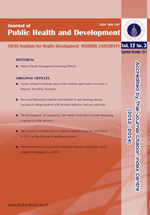Cancer Prevention lifestyle
Main Article Content
Abstract
At least one-third of all cancer cases are preventable. A person’s cancer risk can be reduced with healthy choices like avoiding tobacco, limiting alcohol consumption, protecting your skin from the sun and avoiding air pollution, eating a diet rich in fruits and vegetables, keeping a healthy weight, preventing infection and being physically active and stress free. However, an appropriate uptake of cancer screening tests is also recommended to prevent cancer.
Tobacco use is the single greatest avoidable risk factor for cancer mortality worldwide, causing an estimated 22% of cancer deaths per year. Tobacco smoking causes many types of cancer, including cancers of the lung, oesophagus, larynx (voice box), mouth, throat, kidney, bladder, pancreas, stomach and cervix. Alcohol consupmtion is also a risk factor for many cancer types including cancer of the oral cavity, pharynx, larynx, oesophagus, liver, colorectum and breast. Risk of cancer increases with the amount of alcohol consumed. The risk from heavy drinking for several cancer types (e.g. oral cavity, pharynx, larynx and oesophagus) substantially increases if the person is also a heavy smoker. Limiting alcoholic drinks to 2 for men and 1 for women a day was recommended to live healthy, if consumed at all.
Dietary modification is another important approach to cancer control. There is a link between overweight and obesity to many types of cancer such as oesophagus, colorectum, breast, endometrium and kidney. Diets high in fruits and vegetables may have a protective effect against many cancers. Conversely, excess consumption of red and preserved meat may be associated with an increased risk of colorectal cancer. You should eat more of a variety of vegetables, fruits, whole grains and legumes such as beans while you limit consumption of red meats (such as beef, pork and lamb) and avoid processed meats. In addition, healthy eating habits that prevent the development of diet-associated cancers will also lower the risk of cardiovascular disease.
Regular physical activity and the maintenance of a healthy body weight, along with a healthy diet, will considerably reduce cancer risk. You should be physically active for at least 30 minutes every day.
Infectious agents are responsible for almost 22% of cancer deaths in the developing world and 6% in industrialized countries. Viral hepatitis B and C cause cancer of the liver. Human papilloma virus infection causes cervical cancer. The bacterium Helicobacter pylori increases the risk of stomach cancer. Preventive measures include vaccination and prevention of infection and infestation.
Environmental pollution of air, water and soil with carcinogenic chemicals accounts for 1–4% of all cancers. Exposure to carcinogenic chemicals in the environment can occur through drinking water or pollution of indoor and ambient air. Worldwide, indoor air pollution from domestic coal fires is responsible for approximately 1.5% of all lung cancer deaths. You should live in clean environment and avoid exposing to the air pollution.


